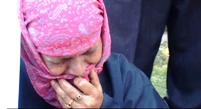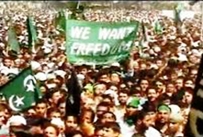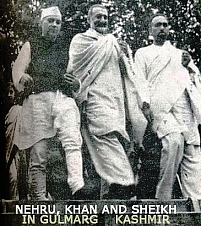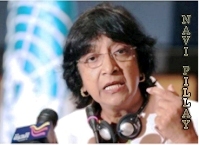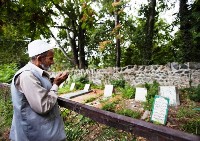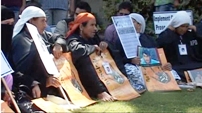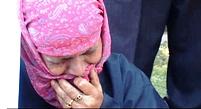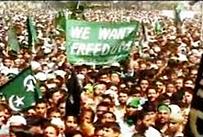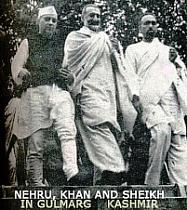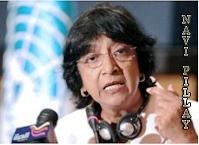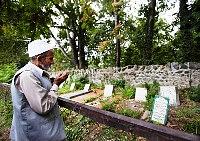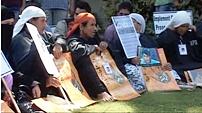Pakistan - Yes, India - No: Kashmir asks why?
A foundation laid way back in 1940’s to ignite a perpetual political inferno in Kashmir and Balochistan by far-sighted trio Mahatma Gandhi, Pandit Nehru and Sardar Patel calculably germinated good dividends. The tall leaders Sheikh Abdullah and Khan Abdul Gaffar Khan were dwarfed and mesmerised into believing that India had everything good in store for the two future trouble spots. The unnoticed conspiracy was hatched in serene atmosphere of Gulmarg, Kashmir.
Pakistan government, a signatory to UN Global Group for protection of Human Rights, invited (September 10, 2012) the Group to investigate enforced or involuntary disappearances, human-right violations, and or missing persons in Balochistan.
The mission accompanied by Rapporteur Olivier de Frouville and working group member Osman el Hajjé, toured all provincial headquarters, met with political leaders, government officials, civil society organisations and human rights activists to gather information on cases of enforced disappearances in the country. The experts analysed and reviewed measures adopted by Pakistan to eradicate the practice, including issues related to truth, justice and reparation for victims.
As there is a widespread belief and concern that New Delhi using the services of RAW (Research and Analysis Wing) to full potential, is behind this policy of "slow bleeding" of Pakistan to create a mirror situation like Kashmir in Balochistan that might at some stage, as expected, be used as a bargain to pressurise Pakistan to go for a compromise as far Kashmir is concerned. Pakistan, in frustration, heightened its crackdown in Balochistan in the last two years killing those victims whose cases were brought to the attention of the Working Group on Enforced or Involuntary Disappearances. Death squads such as Mussalla Diffa Tanzim referred to by Amnesty International to follow a kill and dump policy; Pakistan is expected to answer to the UN for such crimes against humanity.
Earlier in June, the UN High Commissioner for Human Rights, Navi (Navanethem) Pillay, a South African of Indian origin, visited Pakistan. She had a detailed discussion with Foreign Minister Hina Rabbani Khar and interacted with human rights activists and civil society organisations in the country. Her visit was preceded by the special Rapporteur on the Independence of judges and lawyers Gabriela Knaul’s visit in May. A very hectic activity on the part of UN High Commissioner and other officials to conduct enquires considered to be a laudable affair.
Navi Pillay is appalled, shocked and concerned to see what is happening in Pakistan or Syria and while denouncing all kind of violence from any quarter she insists for an urgent action by the international community to put a stop to such killings.
South Asian News Agency reported from New York (December 11, 2011) that while commenting on Kashmir situation Ms Pillay has said that the world body is ‘watching and ‘monitoring’ the human rights situation in Kashmir. Ms Pillay added that "so far there have been ‘no calls’ for a full-fledged commission of inquiry into the situation in Kashmir and my office focuses on Kashmir and the violations there. We have had a number of exchanges of correspondence," She said.
Asked whether the inquiry could be conducted on the lines of Syria, the High commissioner for Human Rights said that for the UN to order a ‘commission of inquiry’ in Kashmir, consent of the government concerned is required to ‘let you in’.
"We can do investigations (in Kashmir) as we have done in Syria by (currently in Pakistan) interviewing people outside the country but for a proper investigation, obviously, we would need to be inside the country," she said
Professor Olivier de Frouville, U.N. Special Rapporteur on Enforced Disappearances and High Commissioner Pillay are very well aware about human right violations, killings with impunity, disappearances, thousands of unmarked graves unearthed in the recent past and millions of Kashmiris held as hostage by one million strong heavily armed Indian army and its Para-military forces.
India, as is known, is hesitant and refuses to allow any UN delegation, a High Commissioner, any Rapporteur to visit Kashmir to take stock of the situation and because of the political clout on international level, perhaps, is not answerable to any crimes committed in Kashmir or elsewhere in India. It is very unfortunate that Kashmir is being ignored by UN Human Rights Commission or UN Global Group for protection of Human Rights. India in a brazen manner can get away with comfort for the following activities in Kashmir for reasons unknown:
SRINAGAR KASHMIR, August 18, 2008:
Two million Kashmiris marched past the United Nations office in Srinagar protesting against New Delhi's rule in Kashmir. Demonstrators shouting pro-independence slogans marched through police barricades within a few meters of the U.N. Military Observer Group in India and Pakistan office in Srinagar. Kashmiris from all walks of life handed over petitions demanding UN Secretary General's intervention to resolve the Kashmir dispute.
CBC NEWS WORLD reports (Sep 5, 2012):
The government in Kashmir rejects probe into unmarked graves and plea of families for those who disappeared during two decades of fighting in the restive region. DNA testing of bodies in thousands of unmarked graves rejected. A report by the government insisted that “all those buried in the graves were militants and said that if families wanted DNA tests, they would have to identify both the graveyard and the exact grave where they think their disappeared relative was buried”. Khurram Parvez, an official with the local Association of Parents of Disappeared Persons, criticized the report as "yet another attempt by the government to obfuscate the truth and sustain impunity."
PRESS TV reports (Fri Sep 7, 2012):
The association of parents of disappeared persons of Kashmir says there are about 8 to 10 thousand people who have disappeared over the past two decades of low intensity conflict. The state-run Human Rights Commission confirmed 38 burial sites containing 2,156 unidentified bodies. The Commission further said that 574 other bodies found in such graves are identified as local residents. The commission also denied governments usual claims saying those buried are foreign militants killed in fighting Indian rule.
THE WASHINGTON POST Asia and Pacific: September 5, 2012:
"Rebel groups began fighting in 1989 against Indian rule, and more than 68,000 people have been killed in the uprising and subsequent Indian crackdowns. Rights groups said some 8,000 people have disappeared, and accused government forces of staging gun battles to cover up killings. The groups said that suspected rebels have been arrested and never heard from again. The state government has said most of the disappeared are young Kashmiris who crossed into Pakistani-controlled Kashmir for weapons training.
The report said random DNA testing of the graves would take years since only about 16 labs in India had the capacity to do it. It could also “attract undesired media attention, because prolonged trauma to the people can also act as a trigger point/event for causing serious law and order disturbances."
The presence of one million non-Kashmiris in uniform armed with sophisticated weapons housed in forcibly occupied properties in localities to keep a vigil on people so that the masses do not venture out on the streets to replicate a situation that unnerved India in the year 1989. With a pretext of “security measure” cement concrete bunkers with gun-toting people, who do not understand the language or even culture, stare at houses to remind people of consequences and their dead in thousands who army thinks are buried and forgotten. It is not difficult for freedom lovers to understand that populace suffers from trauma, mental and psychological problems.
Kashmir is simply asking if UN groups can visit Pakistan and Syria then why it can’t reciprocate the action in Indian occupied Kashmir?
Comments
There are 0 comments on this post


